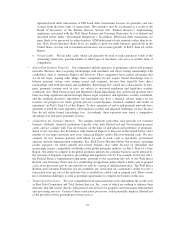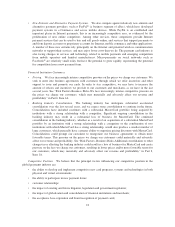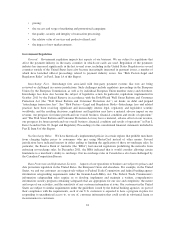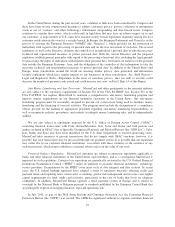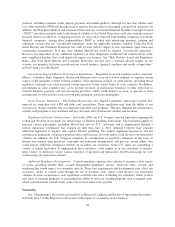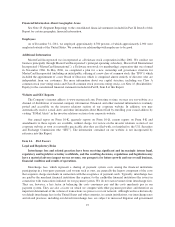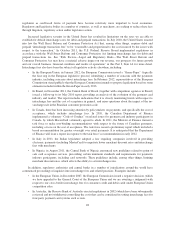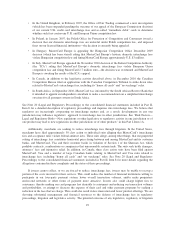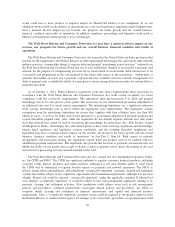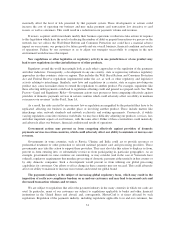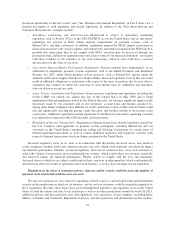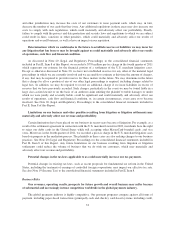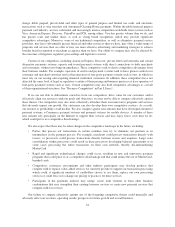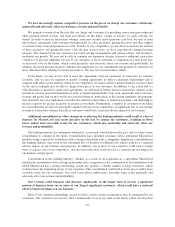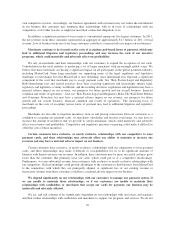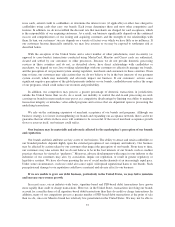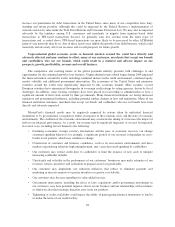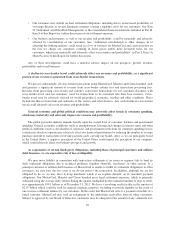MasterCard 2011 Annual Report Download - page 33
Download and view the complete annual report
Please find page 33 of the 2011 MasterCard annual report below. You can navigate through the pages in the report by either clicking on the pages listed below, or by using the keyword search tool below to find specific information within the annual report.• In the United Kingdom, in February 2007, the Office of Fair Trading commenced a new investigation
(which has been suspended pending the outcome of our appeal of the European Commission decision)
of our current U.K. credit card interchange fees and so-called “immediate debit” cards to determine
whether such fees contravene U.K. and European Union competition law.
• In Poland, in January 2007, the Polish Office for Protection of Competition and Consumers issued a
decision that our domestic interchange fees are unlawful under Polish competition law, and imposed
fines on our licensed financial institutions—the decision is currently being appealed.
• In Hungary, MasterCard Europe is appealing the Hungarian Competition Office December 2009
decision (which has been stayed) ruling that MasterCard Europe’s historic domestic interchange fees
violate Hungarian competition law and fining MasterCard Europe approximately U.S. $3 million.
• In Italy, MasterCard Europe appealed the November 2010 decision of the Italian Competition Authority
(the “ICA”) ruling that MasterCard Europe’s domestic interchange fees violate European Union
competition law and fining MasterCard 2.7 million euro—the decision was overturned and MasterCard
Europe is awaiting the results of the ICA’s appeal.
• In Canada, in addition to the legislative activity described above, in December 2010 the Canadian
Competition Bureau filed an application with the Canadian Competition Tribunal to strike down rules
related to MasterCard’s interchange fees, including its “honor all cards” and “no surcharge” rules.
• In South Africa, in September 2010, MasterCard was informed by the South African Reserve Bank that
it intended to appoint an independent consultant to make a recommendation on a simplified interchange
structure for all payment systems in South Africa.
See Note 20 (Legal and Regulatory Proceedings) to the consolidated financial statements included in Part II,
Item 8 for a detailed description of regulatory proceedings and inquiries into interchange fees. We believe that
regulators are increasingly cooperating on interchange matters and, as a result, developments in any one
jurisdiction may influence regulators’ approach to interchange fees in other jurisdictions. See “Risk Factors—
Legal and Regulatory Risks—New regulations or other legislative or regulatory activity in one jurisdiction or of
one product may lead to new regulations in other jurisdictions or of other products” in this Part I, Item 1A.
Additionally, merchants are seeking to reduce interchange fees through litigation. In the United States,
merchants have filed approximately 50 class action or individual suits alleging that MasterCard’s interchange
fees and acceptance rules violate federal antitrust laws. These suits allege, among other things, that our purported
setting of interchange fees constitutes horizontal price-fixing between and among MasterCard and its customer
banks, and MasterCard, Visa and their customer banks in violation of Section 1 of the Sherman Act, which
prohibits contracts, combinations or conspiracies that unreasonably restrain trade. The suits seek treble damages,
attorneys’ fees and injunctive relief. In addition, in Canada, three class action suits have been filed against
MasterCard, Visa and a number of large Canadian banks relating to MasterCard and Visa rules related to
interchange fees, including “honor all cards” and “no surcharge” rules. See Note 20 (Legal and Regulatory
Proceedings) to the consolidated financial statements included in Part II, Item 8 for more details regarding the
allegations contained in these complaints and the status of these proceedings.
If issuers cannot collect, or we are forced to reduce, interchange fees, issuers may be unable to recoup a
portion of the costs incurred for their services. This could reduce the number of financial institutions willing to
participate in our four-party payment system, lower overall transaction volumes, and/or make proprietary
end-to-end networks or other forms of payment more attractive. Issuers also could charge higher fees to
consumers, thereby making our card programs less desirable to consumers and reducing our transaction volumes
and profitability, or attempt to decrease the expense of their card and other payment programs by seeking a
reduction in the fees that we charge. This could also result in less innovation and fewer product offerings. We are
devoting substantial management and financial resources to the defense of interchange fees in regulatory
proceedings, litigation and legislative activity. The potential outcome of any legislative, regulatory or litigation
29





